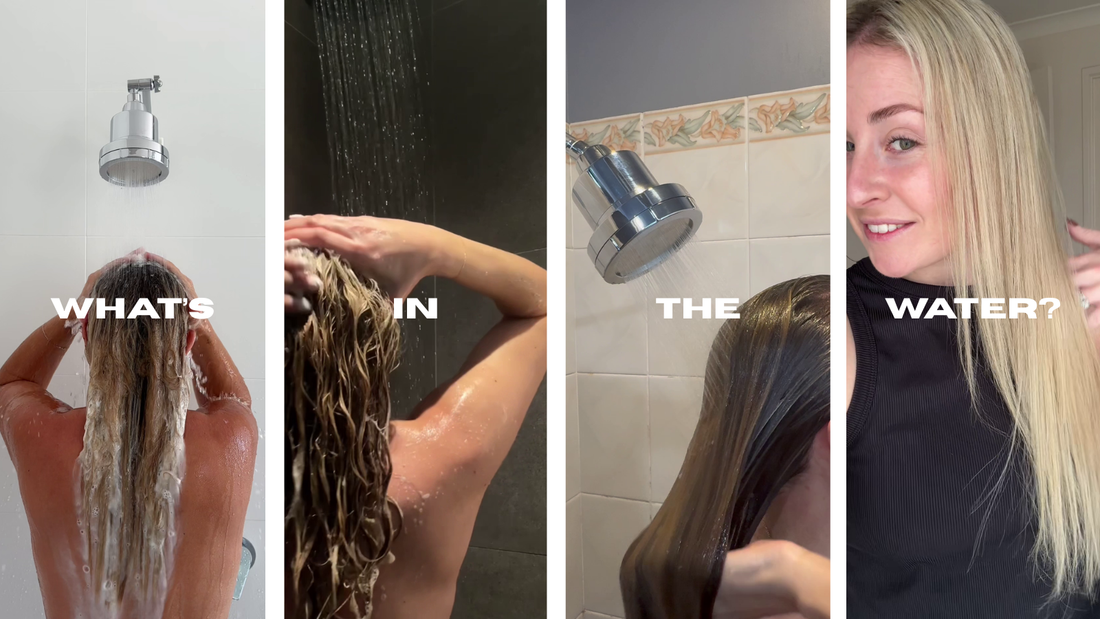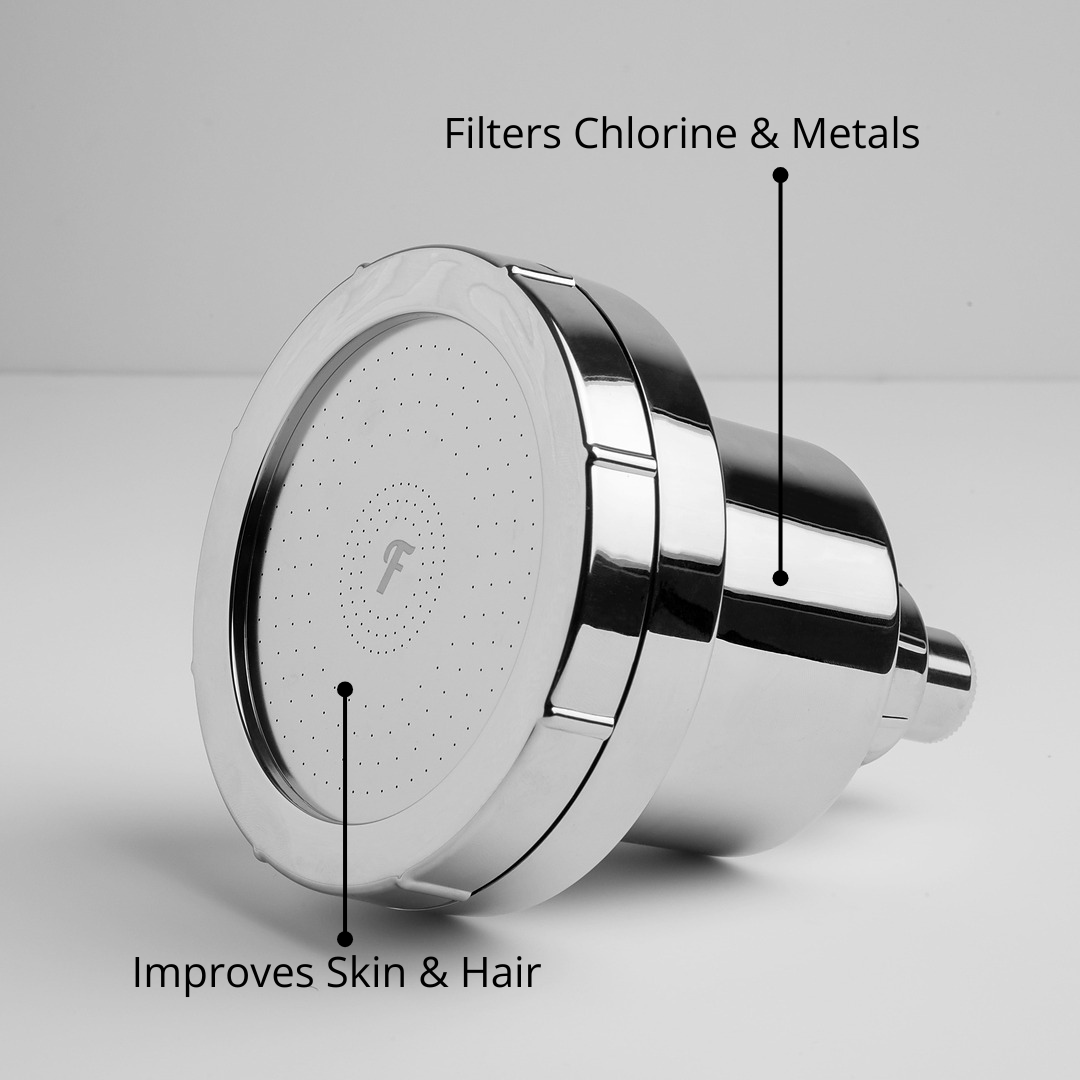
What’s In Shower Water? Discover What’s Really In Your Shower Water And How It Affects Your Skin & Hair
Share
You jump in the shower to refresh — only to step out feeling… dry.
Your scalp’s itchy, your skin feels tight, and your hair? Dull, frizzy, or just “off.”
If you’ve ever thought, “Is it the products I’m using?” — it might not be.
It could be your water.
At Flowy, we’re on a mission to bring better water — and better skin and hair days — to Aussie homes through effective shower filtration solutions.
Let’s take a closer look at what’s really coming out of your showerhead and how a filtered shower head Australia can help improve water quality in your home.
- What’s In Australian Shower Water?
- Why Your Skin and Hair Care Might Be Failing You
- Why You’ve Never Been Told This
- At-Home Testing for Water Quality
- So… What’s the Fix?
- Don’t Just Change Your Products — Change Your Water
- Ready for Better Skin and Hair Days?
What’s In Australian Shower Water? Understanding Water Hardness

Australia’s water is legally safe to drink — and that’s important.
But “safe to drink” doesn’t always mean “ideal for your skin and hair.”
Here’s what might be flowing through your shower every morning:
Chlorine
Used by water authorities as an effective disinfectant to help reduce bacteria.
The downside? It can leave skin feeling dry or tight by washing away your natural oils — the stuff that keeps it soft and protected.
Hard Water Minerals (Calcium & Magnesium)
Hard water makes it tougher for soap and shampoo to rinse clean.
The result? Build-up on your scalp, dryness, and products that just don’t work like they should.
Water hardness refers to the amount of dissolved calcium and magnesium salts in your water, usually measured as calcium carbonate equivalent (CaCO₃).
According to the Australian Drinking Water Guidelines (Source: Australian Drinking Water Guidelines (NHMRC)) , hardness above 200 mg/L is considered elevated.
While not a health risk, these minerals can affect how water feels — often leaving hair and skin less smooth and more prone to dryness.
Heavy Metals & Sediment
From old pipes and infrastructure. Even in newer homes, trace metals or debris can sometimes leave water feeling harsh — especially for sensitive skin types.
Other Trace By-Products
While Australian water meets safety standards, trace levels of by-products or particles like microplastics can still remain after treatment.
They’re not considered unsafe — but they can influence how your water feels on your skin and hair.
Regional Differences in Water Hardness Across Australian Cities

Water hardness levels vary across Australia due to differences in water sources and treatment processes. For example, Sydney and Melbourne generally have softer water with lower calcium and magnesium concentrations, while cities like Brisbane and Perth often experience higher levels of water hardness. Understanding these regional differences can help you choose the most suitable shower filtration system to improve water quality tailored to your local conditions.
Why Your Skin and Hair Care Might Be Failing You
We invest in skincare. We choose salon-quality shampoo.
But water — the base of your entire routine — is often overlooked.
Here’s what harsh shower water can do:
-
Strip natural oils from your skin
-
Make dry or sensitive skin feel worse
-
Leave hair brittle, flat, or frizzy
-
Prevent your favourite products from working properly
Think of it this way:
Would you bathe in a chlorinated pool every day?

Why You've Never Been Told This
Water suppliers test for drinking safety — not for how water affects beauty or comfort.
Their focus is to prevent infectious diseases and maintain safe drinking water.
They’re not testing how water hardness, pH, or residual chlorine impact your skin barrier or hair cuticles.
Completely understandable — but it means most Australians never think to question their water quality in the shower.
We’re here to change that.
At-Home Testing for Water Quality
Ever wondered what’s really in your tap water? You don’t have to be a scientist to find out.
At-home water test kits are widely available and user-friendly. These kits can detect dissolved minerals, metals, or chemicals by changing colour when exposed to your water.
They’re a quick way to see if your water has elevated calcium and magnesium carbonates (the culprits behind hard water) or other common elements.

Try the soap test:
Grab a bar of soap and see how it lathers. Hard water makes it harder to get a good suds — leaving behind more residue and soap scum. If your water feels slippery and lathers easily, you likely have softened water.
Go digital for detail:
Digital testers can measure things like pH, total dissolved solids (TDS), and temperature. They offer a snapshot of your water quality so you can spot high mineral content or unusual readings.
Know the limits:
At-home tests are great for basic insights but might not detect everything — like certain industrial compounds or “forever chemicals.” For complete peace of mind, consider sending a water sample to a certified lab.
Stay proactive:
Regular testing helps you keep tabs on your water quality so you can act fast if something changes.
Taking control of your water quality doesn’t have to be complicated. With a few simple tools and a little know-how, you can make sure your drinking water — and your shower — feel as fresh as possible.
So… What's the Fix? Improve Water Quality with a Filtered Shower Head Australia
You shouldn’t have to move house, rip out pipes, or install a $3,000 system to improve water quality.
That’s why we built Flowy — a filtered shower head designed specifically for Australian homes.

Flowy’s multi-stage shower filtration helps reduce chlorine, capture metals, sediment, and other common impurities, and help minimise the effects of hard water on your skin and hair.
It’s also designed to help minimise build-up in your shower and plumbing, keeping your water fresher and your bathroom cleaner.
The Flowy Filtered Shower Head:
-
Helps reduce chlorine and common impurities
-
Lessens the effects of hard water
-
Captures metals, sediment & other particles
-
Helps skin and hair actually feel clean and comfortable
-
Results in fresher water for your daily shower

Note: While the filter helps reduce many common impurities, it may not address all forms of water contamination or issues outside the scope of shower filtration.
No plumbers. No fuss. Just better water, every day.
Check out our Flowy filtered shower head product page to learn more about how shower filtration can improve water quality in your home.
Don't Just Change Your Products — Change Your Water

Your skin and hair are telling you something.
You don’t need another cream, serum, or scalp oil — you need to fix what’s upstream.
At Flowy, we believe beauty starts at the source.
For more insights on how to care for your skin and hair with better water, visit our blog posts like Best Shower Filter For Hair and Filtered VS. Unfiltered Shower Water.
Ready for Better Skin and Hair Days?
Don’t let your water hold you back.
Upgrade your shower with Flowy — the filtered shower head made for Aussie homes.
- Try Flowy risk-free for 60 days
- Free shipping Australia-wide
- Easy filter subscriptions or one-time purchase
Understanding the Impact of Hard Water on Your Home and Health
Hard water, primarily caused by high concentrations of calcium and magnesium ions, can lead to mineral deposits and scale build-up inside your plumbing and hot water systems. Over time, this scale can reduce water flow, damage appliances, and increase energy consumption due to inefficient heating.
While hard water is not considered a direct health risk, it may make dry or sensitive skin feel worse by stripping away natural oils and moisture. This is especially important for individuals with sensitive skin or other health considerations.
The Role of Water Treatment and Filtration
Water treatment plants employ a filtration process that includes adding chemicals like chlorine and fluoride as an effective disinfectant and for water fluoridation to ensure potable water meets public health and safety guidelines. However, these chemicals can sometimes leave residual effects that impact skin and hair comfort.
Shower filters, such as the Flowy filtered shower head, use activated carbon and other filtration media to help reduce common impurities, chlorine, and lessen the effects of hard water minerals. This filtration process maintains a balanced mineral feel that keeps water comfortable on skin and hair while minimising the negative impact on your shower experience.
The Importance of Regular Water Quality Measurement
Regular measurement of water hardness and contaminant levels is essential to ensure water quality remains within health guidelines. Water utilities and organisations like NSW Health monitor water sources and provide data to the public to maintain transparency and safety.
By staying informed about your water supply and using appropriate water filters or water softeners, you can help improve water quality in your home, protect your household from the effects of hard water and other common impurities, and ensure cleaner, softer water for your daily use.
[Updated 15/10/2025]


